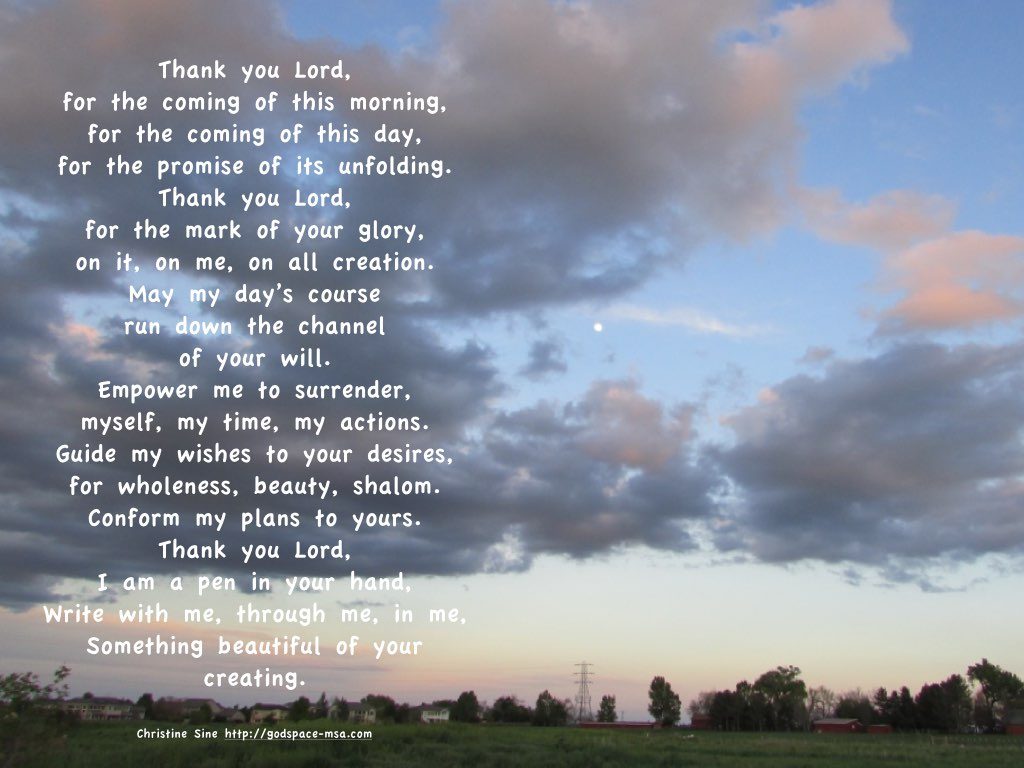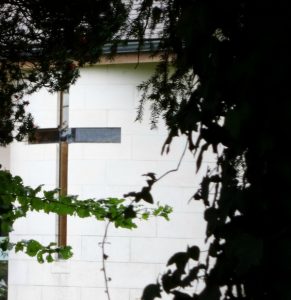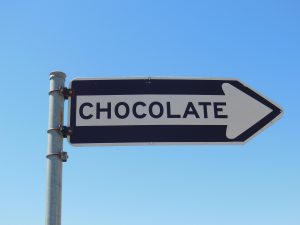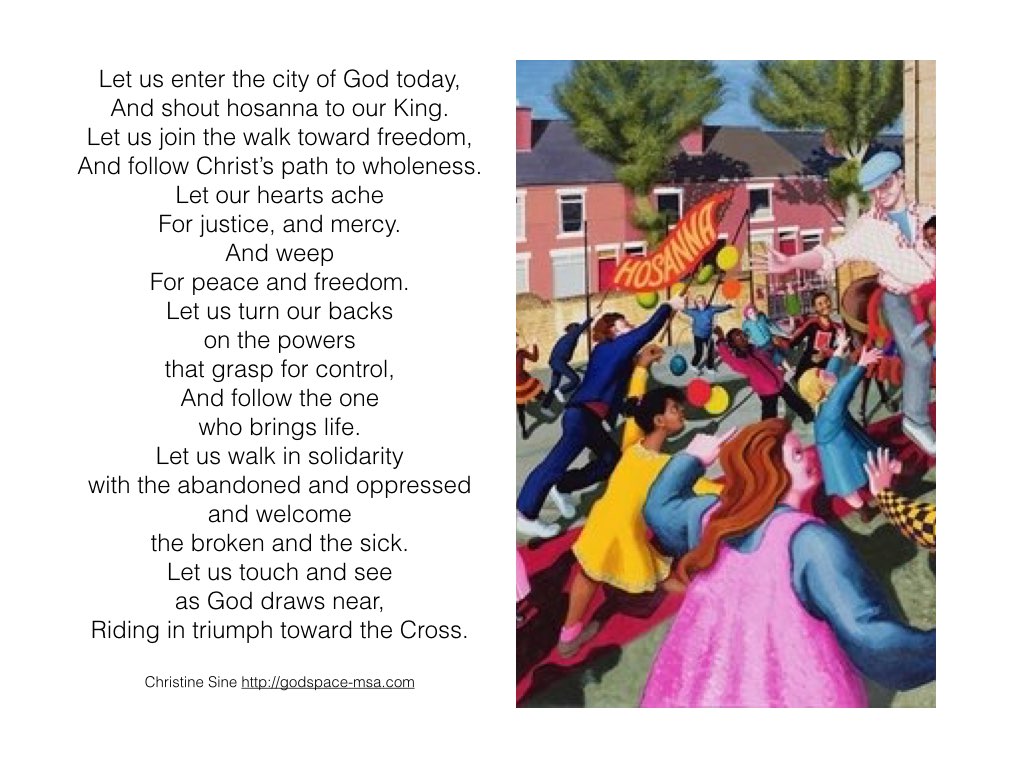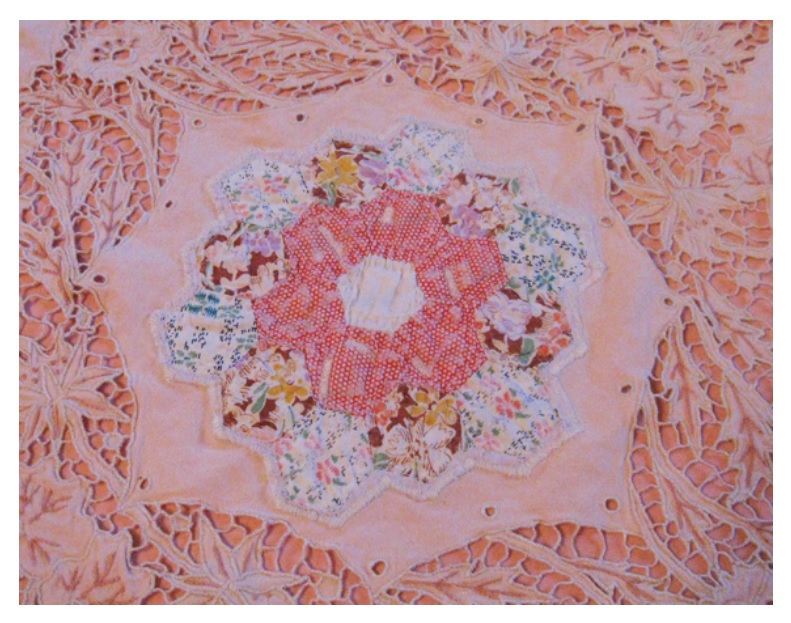In 1511, the German artist Albrecht Dürer fashioned a woodcut of Mary Magdalene’s encounter with the resurrected Jesus as depicted in John 20:15. She has come to the garden tomb looking for Christ’s body, instead she finds a very much alive Jesus and she thought he was the gardener.
This phrase is not a throw away line. It is of cosmic significance! Jesus is indeed the gardener of the new creation.
In the book of Genesis, God creates the garden of Eden, and sculpts Adam and Eve out of its soil to tend and care for it. (Genesis 2:15). It is here that God, the cosmic gardener, comes to walk, to enjoy and interact not just with the caretakers but with all creation. (Genesis 3:8) When Adam and Eve sin they are expelled not just from the garden but also away from this beautiful, intimate relationship they once enjoyed with God.
Journey from the Garden of Suffering
Fortunately God did not abandoned creation or those created to look after it. The journey of Holy week is a journey back into the garden of God.
Jesus suffering began in the garden of Gethsemane, a garden where his agony is poured out in drops of blood like sweat, that seep into the earth. His pain is symbolic of the pain and suffering that became a part of Adam and Eve’s lives when they were expelled from the garden of Eden.
Journey Through the Garden of Death
On Good Friday there is another garden. Jesus, the second Adam, dies at Golgotha and John notes: in the place where he had been crucified there was a garden. (John 19:41) The garden is a place of death, and Jesus death like the planting of a seed: Unless a seed is planted in the soil and dies it remains alone, but its death will produce many new seeds, a plentiful harvest of new lives (Jn 12:24).
Journey Into the Garden of Resurrection
Yet here in this garden, as in all gardens, new life emerges, because gardens are places of life and resurrection too. As the gospel of John tells the story, and the artist Durer pictures it, Jesus very fittingly and beautifully appears to Mary Magdalene as the gardener. This is the garden of the resurrection, the new creation garden where the new world of God is revealed in all its glory and everything once more flourishes.
Whereas the Genesis story begins in paradise (a garden) and ends in our present garden world of pain and suffering, the Easter story begins in the garden of pain and suffering and ends in a garden of wholeness and flourishing, a new paradise in which we are once more able to walk intimately with our God and find abundant provision. In this new garden Jesus, the head gardener, once more invites us to be who God created us to be – stewards of all creation, tending this new paradise of wholeness and abundance so that it once more flourishes for all the creatures of the earth to enjoy.

Art at Overseas Ministries Study Centre
In Isaiah 65 and again in Revelation 21 we see beautiful pictures of this new garden of God. Life and freedom, wholeness and abundance flourish and we look forward in hope to its completion.
The challenge we face is to cooperate with Jesus the gardener in the work of this garden. In many ways God’s new garden is still in its infancy, and like any newly formed garden, needs to be tended in order to flourish. Soil must be fertilized, seeds planted, watered and nurtured. To see it completed we must willingly journey with Jesus from the garden of Gethsemane with its struggle and suffering, through the garden of death to the new life that begins in the garden of the resurrection.
The old Adam and Eve were excluded from the Garden of Eden by a barrier of angels with flaming swords. Jesus the new Adam, ripped apart the barrier with his death and stands ready to welcome us into the new paradise garden. The barrier that separated us from the holy place of intimacy with God and God’s world has been removed. Now together with all God’s people and indeed with all God’s creation we can enter into the intimacy of relationship with God in a restored world of wholeness and abundance. We must continue to till and fertilize the soil, plant seeds of freedom and generosity and wholeness until the full glory of God’s resurrection created world is revealed.
“It seems then,” said the Unicorn, “that there is a real Tash, after all.”
“Yes,” said the Dwarf. “And this fool of an Ape, who didn’t believe in Tash, will get more than he bargained for! He called for Tash; Tash has come.”
This is a scene from The Last Battle, the seventh book in The Chronicles of Narnia series. There had been a movement stirring in the lands around Narnia and finally in Narnia itself, that was built on fear, deception and hunger for power. Some, like the Ape, had helped to create a false god called Tashlan, which was a mash up of the name of one country’s god, Tash, with Aslan who is the King of Narnia and the Christ figure of the story. The puppet god Tashlan was used to frighten and manipulate the crowds, twisting what they had known to be true while manipulating both innocence and ignorance alike, creating anger, divisions and violence. Eventually they drop the pretense of “Tashlan”, and just use the name of what they truly served, the evil god, Tash.
It all sounds too similar to what we are witnessing today, in the form of Donald Trump, a self-identified Christian who speaks of a very strange Christ, as well as some of his followers. Just like in the Narnia story, Trump did not arise out of a vacuum. During the civil rights era from the time of Truman, the racist lesions on the American soul were increasingly exposed. Without going into all of it here, our history reveals a gradual movement towards a division in the political parties that was decidedly racially charged. Fear and resentment of the other has always been at the heart of our deepest wickedness. Fear and resentment of the other is described at the very beginning of our sacred narratives. The beautiful archetypal narratives of Genesis describe the loss of communion between man and woman, moving from a sense of unity to an identity that is now over/against one another. The sense of being bested by his brother stirred the man Cain to become the first murderer, eliminating one he had once loved.
We want what the other has, we fear what we have will be taken. We are very naturally people who project our discomfort and fear outward, towards one another. They are the cause of this trouble. They are the cause of my anguish. If I eliminate them, then all is right with the world again. It may happen through all-out war, it may happen by finding a way to jail thousands of black men, it may happen by silencing the voices of those who disrupt the status quo of power. There is something that rises up in us that sees difference and competing views and needs as a threat. There is something that rises up in us to snuff it out. It’s in us all.
I had the opportunity a few years back to sit and talk with Sr. Helen Prejean, a nun who works tirelessly to end the death penalty. She has been spiritual advisor and comforter to many a death row inmate right up to their last breath. There are many who feel that her compassion for the condemned is an act of betrayal towards the perpetrators’ victims and their families, and thus resent her. However, Sr. Helen never minimizes the horror of their crimes, nor the fact that they have a serious debt to pay to society. She does believe that we are not good or wise enough to mete out death as a means of punishment, because in killing the other, we become the very thing we hate. We diminish ourselves.
I had read her book and saw the movie based on it. I remarked on seeing how the main character, a rapist/murderer, was slowly depersonalized through the process of execution. It felt like they were hiding his humanity so that those who carried out his execution, whether in actuality or through some lesser agency, could be somewhat removed from the fact that they were also taking a human life. As a former nurse I wondered at the use of an alcohol wipe to clean his skin for an IV insertion. Why bother if he will be dead in a few minutes? It all seemed like a ritual of denial to protect us all from the dirty truth.
Sister Helen responded, “You get it!”
I wasn’t sure I did. What I did know that was that at that point in my life, if that man had done to my daughter what he did to another woman’s daughter, I’d want to tear him apart with my bare hands. I would not want to show any mercy. And if I could not physically do that deed, I think I would still feel a smug satisfaction at his end by whatever means.
But there are moments went you glimpse something so new and so light that you have to catch your breath. In those moments with Sr. Helen I realized that I had looked upon mercy right in the face. It was a mercy that did not lose its boundaries, for a great evil had been done, but it was mercy none-the-less. I saw that mercy moves in a whole new way. Mercy does not project its hatred, resentment, pain or fear onto another. Mercy does not need sacrifice to be satisfied. Mercy sees all things differently. And it was mercy that told my own heart of the same murderous impulses that were within me. Jesus confirmed the same in all of us.
And now we see impulses of fear, hatred and resentment welling up and roaring out from large numbers of people with hearts like mine -and yours. Wily politicians have been stirring deep, age-old resentments long before Trump appeared on the political scene. Deep divisions and disrespect have been at play for years, helping to create this perfect storm. Some of us pushed back, and some, perhaps too many, did nothing. In any case, we have collectively called for Tash, and Tash has come. We are reaping what we have sown. Violence is the logical outcome. Hurt the other, hurt the ones who are responsible for our pain! Hurt the ones who make me feel inadequate or who might want a piece of our pie. Take the power by force. Just today I read a quote by Trump that warned that riots would ensue if he does not get the Presidential nomination. And he is probably right.
But then, there is the path of mercy.
Now we come upon Holy Week, which is the journey towards crucifixion for Jesus of Nazareth. The Cross of Christ both exposed and predicted our current situation even way back then. We projected all of our resentment and fear and hate onto Jesus and put him to death. (He didn’t conquer the Romans! He’s letting in the wrong people, changing our status quo! He’s not impressed with my righteousness or riches!) The Cross is the inevitable end of our system of justice and it judges us. We kill that which makes us uncomfortable and that exposes our naked, selfish souls. Only that time 2000 years ago, we killed pure innocence.
And God responds to Christ’s gruesome death with mercy. St. Bonaventure once said that the two poles of the Cross stand in juxtaposition to each other, as does every human polarity we can think of – heaven vs. earth, rich vs. poor, gay vs. straight, male vs. female, black vs. white, Republican vs. Democrat, Christian vs. Muslim, East vs. West and so on. And Jesus does not resolve the great tension between the poles by eliminating one side or another, as we would do. Instead, Jesus is the mercy that hangs in between them, that holds the tension. In that space, he teaches us the way of mercy. He dies.
That’s Holy Week. That’s the way of the cross. While we are not facing a literal cross next week, we need to do some real dying, especially to our egos, that is, to the things to which we are most attached that keep us in animosity towards one another. It is not just them over there who are creating chaos and division. What would it mean to die to our political beliefs especially in this contentious season, and choose the common good? What would it mean to die to our religious beliefs? To our financial and nationalist idolatries? To our measures of good, better, best? To our demandingness, in that we are 5% of the world’s population that uses 40% of the world’s resources? What if we were to die to anything within our hearts that divides, casts out or withholds from one another? What if we were to die to it all? What would this nation look like then?
We live in a time of the rise of yet another great evil, the rise of a new fascism and its infelicitous offspring: want, violence, and ignorance. We can no longer treat the Cross as merely a free ticket to heaven and a symbol of being part of the “in” club. We must see it for what it truly is- the place where we received mercy for our murderous hearts, and a place where our own murderous impulses, in whatever forms they come, are finally put to death. In that light we can never again see the Cross as a symbol of separateness and exclusion, or as a call to rise up and defend our truth and our stuff and our tribes, especially at the cost of others’ wellbeing. It can only be the pathway to the end of strife. It is finally, the pathway to Peace.
Let it jolt us awake.
Then, we can be the Mercy in this world. We can be the ones in whom violence comes to an end, and radical hospitality begins, revealing the heart of God for all. This paradoxical path to new life and a new world is always downward first. Downward to death, so there can be Resurrection.
Shalom, friends.
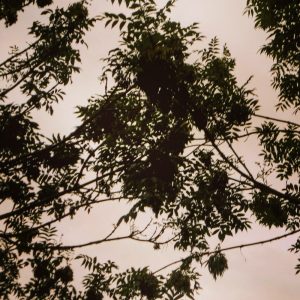 By Joy Lenton
By Joy Lenton
Who of us would choose to die? To leave a life we’ve grown rather fond of, to be tugged away from loved ones? Yet in being Christ followers we are all called to die to self on a daily basis, to relinquish our way to God’s way, to surrender to what so often feels like a living death in order that we can live well to a deathless, eternal life.
Eternity beckons. We have a calling here that stretches beyond confines of time itself. A work which seeps into the lives of others while we inhabit flesh and when we’re reduced again to dust and ashes.
Lent lends itself to introspection. A focus on fasting and seeing those things we are also hungering for. It helps to shape and define the deeper thoughts inside. Death haunts our hearts because the spectre of the cross looms large before our inner eyes.
It’s no mean thing to willingly enter into death’s dark hallways. It’s an act of supreme love and grace when the very act of doing so is redemptive for the human race.
God-made-flesh carried that burden and awesome, individual privilege. Jesus came to earth to bring us living birth at the cost of embracing death for us. He carried the weight of the world, all its heartache, heartbreak, sin, guilt, shame and pain.
Jesus took all of humanity’s dross and nailed it firmly to the cross as thorns pierced His brow and nails nagged at frail flesh, and a spear rent His side. He yielded Himself with an act of supreme willing obedience that momentarily tore His tender heart away from His Father, who could not bear to look at His sin-bearing Son. The curtain was broken. A gap in time and eternity appeared.
I fail to fully take it in, finding fathomless depths to an unfathomable moment in our history. For who can truly understand what Jesus deliberately sacrificed to die for us?
Our reassurance is that it was an act conceived and carried out by Love Incarnate, the only way by which we can be reconciled to Holy God. There was no extraction here because Jesus willingly laid down His life to offer us the promise of salvation and hope of eternal life.
No one took it from Him, although the Roman soldiers probably thought they did. This was a beautiful, sinless life knowingly offered as sacrifice, as ransom payment for the sins of the world. This has the heavy ache of holy seen in our ordinary. This is where we fall to our knees…
No extraction here
There is no extraction here
Only rainbow refraction sending
splinters of Light everywhere
But only those beyond the veil
can view its dazzling beauty
seen skywards like entrails
Sharp pierce of thorns bleeding
serve only to allow escape
as mercy and love flow freely
Forgiveness floods like blood
running from head to toe
returning to heaven above
God Incarnate gasps and dies
Willingly gives up the ghost
to receive fresh Breath of life
©JoyLenton2016
Abba Father,
Thank you for allowing your one and only begotten Son to become death for us.
We linger long at the foot of the cross, marvelling anew at all Jesus willingly went through on our behalf.
We pause and pray and stay transfixed by such amazing grace.
We desire to give our all for the One who gave His all to set us free from sin and shame, who laid aside His holy majesty and awes us by the mention of His Name.
Help us to sense even a smidgeon of what it means.
Enable us to live well in the light of the glorious cross.
May we see its necessity in setting us free.
And live lives worthy of being your adopted, blood-bought sons and daughters.
Exodus 15:13: “In steadfast love, You have led the people You redeemed. In Your power, You will guide them to the holiness where You dwell.”
Prayer:
Oh, Lord, in Your love,
You have led us forth –
from slavery to freedom,
from woundedness to healing,
from defeat to victory,
from sorrow to joy.
Guide us again
with good leaders
and signs as clear to us
as a cloud by day
and a fire by night.
In Your strength, guide us
to the place where we can find
You, waiting –
a place where we cannot be
disappointed
in what You appointed for us,
but
Lord,
we have oh so much
to leave behind –
the fears,
the expectations,
the grudges,
the chaos,
the years of memories
of our doing things all wrong.
Help us, Lord, to let go
of the dross
as we cross over
into living free
and loving freely
in Your holy way.
Thoughts: What does God want me to let go of or leave behind? What stands in the way of God’s love for me – and mine of loving God and everyone around me? How do we get lodged in love? What will God’s dwelling place look like and feel like to me?
from Mary Harwell Sayler’s book: Praying with the Word on Love
By Gil George
This year as I engage with lent during my recovery from a challenging season of life, I have been led to give up abstraction and take on presence. Abstraction has a few definitions, and I am speaking primarily of allowing ourselves to be diverted to a general idea or quality rather than an actual person, object, or event which leads to the state of someone who is not paying attention to what is happening or being said. To illustrate what I am getting at I would like to tell you a parable.
While on a deep sea fishing trip, some men came upon a family that was clinging to a crudely constructed log raft. When the family saw the boat approaching they began to call for assistance and the fishing boat drew nearer. When the fishermen saw the raft they immediately began questioning the construction of the raft, discussing the knots that were used, the type of wood, and that the raft obviously needed a bit more buoyant wood. Eventually they drifted past the family and continued their fishing trip while discussing the principles of raft building. Later, when the mother of the family and the surviving child were picked up by the Coast Guard they asked through their translator why the other boat kept going past them.
This is the danger of abstraction that the church and I have to address in ourselves, that allowing ourselves to be distracted by issues puts others’ lives in real danger. I have to confront the desire for self-protection that pulls me away from engaging others’ lives. I have to ask myself who I might be passing by when my care could be the difference between being “lost at sea” and someone reaching a “safe and dry” shore. During this Lenten season, I am laying issues like the nature of biblical authority, whose interpretation of the will of God is valid, and what constitutes sin aside and am instead taking on being present to others no matter what. I would like to think that I will be successful at this intention, but old habits are hard to break, and I am in the boat, not the raft. I don’t have the urgency of being forsaken driving me. I am not in danger of death.
That is the truth that God is leading me in, that my calling is not to debate abstractions, but in the words of the old chorus I’ve Got a River of Life, to be a channel for the river of life that flows from God’s Spirit. The truest test of the strength of my faith then is not in whether I can win all the spiritual debates, but whether I have a river of life flowing out of me that makes the lame to walk and the blind to see, that opens prison doors and sets the captives free. Are we ready to step away from the abstract spiritual debates that bring more wounds and distract us from God’s mission and instead be present to those who are wounded and hurting no matter the cause or cost? I don’t know if I am, but with God’s help maybe we can let go of the deadly distraction of abstraction together.
This afternoon I am posting a special prayer that has come out of my reflections this week. I love the Palm Sunday parade that will take place in so many of our churches this Sunday, but I am also reminded that this parade is the beginning of Jesus walk towards the cross and his triumphal entry is actually a walk into the most radical and subversive week of his life. My thoughts constantly return to what I wrote in a post a couple of years ago:
Jesus’ ride into Jerusalem was obviously headed for a collision with the powerful Roman empire – a collision that would cost him his life and change history forever. Jesus triumphal entry into Jerusalem may have begun with crowds shouting Hosanna but it ends with Good Friday and shouts of “crucify him”. It doesn’t end with a gold crown but with a crown of thorns. (Read entire article)
This was the week that literally changed the world. I encourage you to take some time each day this coming week to sit quietly and contemplate the last journey of Jesus life. Immerse yourself in his pain, but look beyond that to the resurrection. Remind yourself that the focus is not death but resurrection. What comes to mind as you think about this? What subversive steps might Jesus ask you to take in order to follow him to the Cross and beyond? Are there ways that you need to resist the wealth and power of our culture in order to follow? Are there new ways that Jesus is calling you to be a change maker?
During this season, perhaps more than any other I think of those who have pilgrimaged before me and taught me about God. Those who have made sacrifices, and recorded their experiences, so I might know him.
As we celebrate the ultimate sacrifice made by God of his son Jesus, I am humbled by the others in my own life who walked the walk and set the best examples of love in action.
I remember my Aunt Mildred. My Dad’s sister was one of five girls in a family of 10. She lived to be 102 and five months. Her gift was one of tenacity and great humor. I remember visiting her in the nursing toward the end of her life and her telling me about how all the girls had to make a slip before their 12th birthday. I remember her demonstrating how she had hand-hemmed the slip and even though she held no material or needles you could tell how meticulously each stitch had been placed.
Oh, she could be ornery. Got in her head one day she was not sure she wanted to be around for her 100th birthday. “You’d better be here! I am driving 3 hours just to take your picture and you’d better show up. Besides I can just picture God looking down and saying: ‘that Mildred Vanstone. She is a wonderful Christian woman and she surely belongs here. But I have to think of the others. If only she would stop complaining.’”
A little while after I got home from that visit I got a call from my cousin, her daughter, Dorothy. “What did you say to Mom, Kathie?”
I was caught and had to admit, rather sheepishly, to the conversation. “Oh that explains it. I could not figure out what got into Mom. She was always complaining thinking staff was stealing her candy and bossing them around lately. When I went in today she was asking them how they felt, about their families and offering them her candy. I think she is trying to nice her way into heaven!”
Here the woman who I saw modeling the Christian family walk for all my life, showed that it is never too late to die to self. Her daughter and I had a wonderful laugh and obviously Aunt decided to stay around a few more years just to be sure. I never heard her complain again.
My friend of 33 years, Joan, was another one of my mentors in what a true understanding of God’s love can do. She had survived alcoholism and her physician husband, who had her committed so he might philander. Shock treatments had not dampened her spirit. When she finally mustered the courage to leave the abuse, she worked hard and long to forgive him. The settlement from the marriage, she had let her lawyer invest for her, she never saw. The lawyer stole it all. She forgave him too.
Joan showed me that forgiveness was so much more than words. It was action. It was something you did in person so the other could see it in your eyes and hear it in your voice. She said, “can you imagine that Jesus spent his last moments on earth forgiving those who had placed him on the cross and included the thief beside him, inviting him to join him in heaven? How little then is it for me to forgive those whose intent was to harm me.”
She was rewarded with the love of her five wonderful children and many more like myself, who called her friend. To the very end, she welcomed all who needed a moment of her time and her wisdom. Her generosity with her love and forgiveness was at a level I pray to achieve.
In the center of my dining room table cloth there is a single block of a very old quilt. It was one Aunt Mildred and her sisters sewed by hand when they were very young girls. It is all that is left after years of keeping generation after generation warm. The stitches are perfect.
These are but two Christ-centered models who join many who to me are “strangers in high places,” as Og Mandino refers to them in his book Mission Success, who have enriched my own walk with Christ over the years. These “strangers in high places’ include authors of the New Testament, the Desert Mothers and Fathers, Julian of Norwich, Hildegard of Bingen, Francis of Assisi, C.S. Lewis, Oswald Chambers, Evelyn Underhill, Henri Nouwen, Thomas Merton and so many more.
Those who gather in this space continue through their writings to pass it on. May all these voices never be silenced and continue to live on through each of us.
As we draw to the end of this Lenten period, it is my prayer that we never forget those who showed us, by example, what Christ suffered to give us. May we do the same.
As an Amazon Associate, I receive a small amount for purchases made through appropriate links.
Thank you for supporting Godspace in this way.
When referencing or quoting Godspace Light, please be sure to include the Author (Christine Sine unless otherwise noted), the Title of the article or resource, the Source link where appropriate, and ©Godspacelight.com. Thank you!


